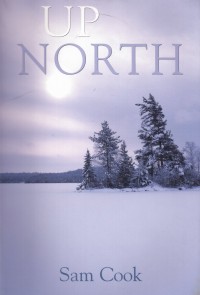Up North by Sam Cook (1986 and 2003. University of Minnesota Press. ISBN0-8166-4267-2)
Everyone needs a toilet book. At least I do. Something to divert one’s attention from the business at hand, so to speak. OK, that’s not strictly true. There are folks whose constitutions require only brief forays into the lavatory: I’m not one of them. Too much information? Sorry. Not relevant to a book review? Oh, but that’s where you’re wrong, dear reader.
Recently, when I’d finished the latest copy of Conservation Volunteer (that great little magazine put out by the Minnesota DNR) my literature of choice for the potty, I searched my bookshelf for something suitable for…contemplation. The stories have to be short, to the point, uplifting, and well written for a book to serve such a function. Sam Cook’s Up North is just such a collection. To be fair, it would also be great bedside material or sitting in the deer stand material or toss in your Duluth Pack and take along the trail material as well. In fact, that last application, where this thin volume is pulled out of a canvas satchel after a long day of paddling and portaging in the wilderness, opened before a roaring campfire, and read aloud, might be the most appropriate suggestion of the lot. Like a well-seasoned woman, you know, the kind with girl-next-door looks and keen intelligence who’s comfortable in a canoe, at the symphony ball, or giving birth, Up North seems to fit in wherever you decide to read it.
Not every story in this collection is great literature or reminds one of John Muir or Sig Olson or Aldo Leopold or Jack London (or any of our other great nature/outdoor/conservation writers). But there are some tales squeezed into the 180 pages of this seasonal work (the stories are arranged “Spring, Summer, Fall, Winter” as their topics dictate) that reach such heights. My favorite? The story of octogenarian brook trout fisherman Enok Olson. Just give a listen to this description of a day on the water with Enok in “The Trout Fisherman”:
Soon we could hear the stream, and finally, after sliding part way on our rear ends and climbing through some cedars, we were there.
At one of our pauses on the way down, Olson said, “We may not get any fish, but I know you’re gonna marvel when you see the river.” He was right This wasn’t just a stream. It was a canyon. Sheer walls of sedimentary rock rose from the water’s edge, some 40 feet high. Where there were no walls, the valley rose at a pitch like the one we had just slid down.
The water was low, almost as low as Olson ever remembered seeing it. In the shallows it was the color of weak tea, but coffee brown in the pools below the ledges and along those sheer walls.
Olson couldn’t wait to get a worm on his hook and get it in the water. He wasn’t asking for much. “If I get one fish, I’m happy,” he said. “If I get two fish, I’m really happy.”
He pulled his hip boots up, put his walking stick in front of him, and waded into the stream. It’s hard to imagine what it must be like to be stream fishing at 89 when you’re eyes won’t see all you want them to see and your wading legs aren’t as steady as they once were.
“They’d Rather Have Cash” takes readers inside L.L. “Newt” Newton’s fur buying operation in Grand Rapids, Minnesota, perhaps giving us a glimpse of what it was like to trade furs back in the heyday of the voyageurs. Cook’s descriptive and narrative powers are on fine display in that tale, drawing us into a world that most of us will likely never traverse. Some of the shorter pieces, like “Stocking Feet” whet our appetite. Cook teases us with the beginnings of a duck hunting story: We awaken with the protagonist, can smell the morning coffee, feel the crispness of the early morning air as we load our gear, but we don’t follow the story into the duck blind itself. That’s not a bad thing. It points out, as many of these essays do, how important the smells and sounds and tastes that accompany great trips or hunts are to our memory.
Sam Cook has been an icon in the Duluth writing community for decades. It’s a testament to his story telling ability that, when I pick up the latest Sunday edition of The Duluth News Tribune, his work is the first that I read. Here’s hoping he keeps writing great stories of the world outside our doors for years to come.
4 and 1/2 stars out of 5. Take this book along with you and read it aloud around the campfire on your next outing!



